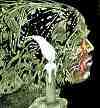
Modern Times
Idle Theory argues that human beings (and indeed all living creatures) must act to maintain or increase idleness, or else face extinction. The entire process of human history, it says, is one in which human ingenuity acted to reduce the burden of work, through technology, through ethical conduct, through law. This process always had, as its goal, a condition of perfect idleness. It was always accompanied by a dread of the opposite - a condition of inescapable, unremitting toil.
It is the contention of Idle Theory that received human morality emerged in times of extreme difficulty, when human life was extremely busy. During those times, it was essential that everyone carried an equal burden of work, that none were more idle than others. At the same time, there arose taboos against luxuries, games, and promiscuous sex. These ascetic societies were survival societies. Unequal, self-indulgent societies, facing the same dire circumstances, simply disintegrated. Only the ascetic disciplined moralities survived to propagate their ethical message.
Over many millennia, and largely thanks to that discipline, human ingenuity gradually increased. Technological innovations began to multiply at an exponential rate. Recent centuries have seen humans constructing, in rapid succession, machines powered by coal, oil, and nuclear energy. A great deal of human work has become automated.
The result has been a rise in human idleness, at least in those societies where automation is most advanced. And with this rise in idleness there has arisen an attendant moral liberalism. As idleness increased, it was no longer necessary for social equality to be maintained, for luxuries and games to be forbidden, for sexual relations to be restricted. The institution of slavery, upon which the ancient world was entirely dependent, has vanished because it is no longer necessary. Modern liberalism, the product of increased idleness, dissolves ancient moral codes.
In the USA, in the 18th century, 19 out of 20 people worked on the land to produce the food to feed the population. In the 20th century, less than 1 in 20 people work on the land in food production. The ancient dream of humanity, of release from toil, seems to have been fulfilled.
But there's a catch. The 18 out of 20 people freed from work on the land were not freed from all work. Human idleness, on average, did not rise from 5% idle (19 out of 20 people working) to 95% idle (1 out of 20 working). As farming machinery displaced people from the land, these people were obliged to earn their living in some other way. Since the necessities of life - food and shelter - were largely being provided by a minority of the population, they could only earn a living by making and selling luxuries. Curtains for windows, carpets for floors, upholstered furniture, fashion clothes and shoes, art, music, poetry, novels. And, of course, sex and drugs. Everyone worked just as hard as before, but now most of them were making and selling luxuries.
So the effect of technological innovation in agriculture was not to reduce human work rates by 90%, but to keep everyone working as hard as they had before, but now producing 20 times more goods. Technological innovation has resulted not in increased human freedom, but in increased productivity. And this rise in productivity has meant that natural resources are consumed 20 times faster than before, and 20 times as much pollution is generated, to the point where human industry is arguably having global climatic consequences in the form of acid rain, ozone depletion, and a buildup of greenhouse gases in the atmosphere.
This exchange of one form of obligatory work - growing wheat on farms - to another form of obligatory work - sewing sequins on dresses - represents no real improvement in the human condition. Life, for most people, most of the time, continues to be as much one of obligatory year-round work as it was in any preceding century. And, indeed, with the gradual lapse of the mandatory work-free religious sabbath, that work is liable to intensify rather than diminish.
The modern Western world is materially richer than it ever was. There is food, shelter, carpets and curtains, art and music. But Western man is as much constrained to a monastic cell as his ancestors: it is simply that the cell to which the exhausted monk returns is decorated with carpets and curtains and cushions, with paintings on the walls, and a TV in the corner.
The obligatory production of luxuries, the necessitation of the unnecessary, is the glaring absurdity of the modern era. For, since technology does not free men from work, men must continually hunt around for something - anything - to sell. If that happens to be weapons, or instruments of torture, that is what must be sold. Or if it the most obscene and degraded pornography, so be it. Or if it is a drug whose addictive character is such as to ensure an captive clientelle, so much the better. And since nobody actually needs any of these products, a barrage of advertising has to be used to convince buyers that they need what they don't. And at the same time, precisely because these products are unnecessary, and the demand driven by fashion, it is quite possible that what sells like hot cakes one day will find no buyers the next, and a profound insecurity and uncertainty applies to every occupation.

